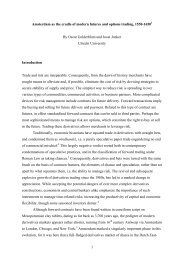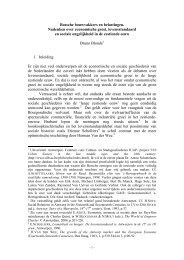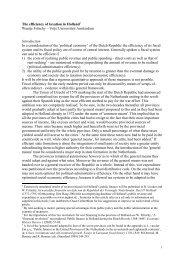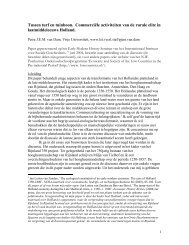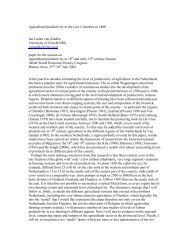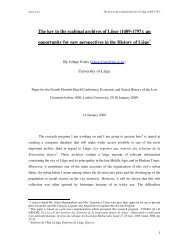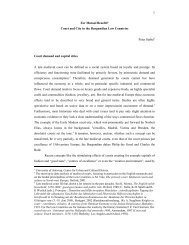Justyna Wubs-Mrozewicz LOOKING TWICE - Economy and Society ...
Justyna Wubs-Mrozewicz LOOKING TWICE - Economy and Society ...
Justyna Wubs-Mrozewicz LOOKING TWICE - Economy and Society ...
Create successful ePaper yourself
Turn your PDF publications into a flip-book with our unique Google optimized e-Paper software.
Looking twice, <strong>Justyna</strong> <strong>Wubs</strong>-<strong>Mrozewicz</strong> January 2009<br />
Hanseatic influence on Norwegian economy <strong>and</strong> politics. In fact, due to recurrent turmoil in<br />
the Sc<strong>and</strong>inavian succession politics, the rulers of Norway needed Hanseatic support not only<br />
in economic, but also political terms.<br />
Holl<strong>and</strong>ers had been nominally accorded rights already in 1376, yet it had happened in<br />
the general context of the Cologne Confederation <strong>and</strong> had no actual bearing for their position<br />
in Bergen. 35 As privileges can solely have an impact if those who can profit from them are<br />
present <strong>and</strong> active in a place, only the privileges granted from the 1440s on can be examined<br />
in the light of the Hansards-Holl<strong>and</strong>ers-Bergen relations. In 1443, Amsterdammers were<br />
given the right to trade freely in Bergen <strong>and</strong> Norway, with the exception of Icel<strong>and</strong> <strong>and</strong> other<br />
tributary l<strong>and</strong>s. 36 This privilege has been seen as a measure against Hansards, 37 yet in fact no<br />
rights were granted – at least explicitly – which would be of direct harm to Hansards or<br />
infringe on their special rights. The same concerned the ensuing confirmations. 38 At that time<br />
the king of Denmark <strong>and</strong> Norway, King Christian I, needed both the financial <strong>and</strong> political<br />
support of the Hanseatic towns in his conflicts with Sweden. A breach of relations with<br />
Lübeck could have cost him dearly. 39 In 1469, in a similar political context, the king even<br />
explicitly limited the number of Holl<strong>and</strong>ish ships which were allowed to enter Bergen to one<br />
or two ships. 40 The king stressed the vital role of the Hanseatic merchants in the Norwegian<br />
economy, namely that Hansards brought meal, malt <strong>and</strong> beer in accordance of several<br />
privileges, which strengthened the country. Moreover, Hansards had proved their friendship<br />
<strong>and</strong> faithfulness. 41 In 1471, the Holl<strong>and</strong>ish trade was further limited in spatial terms to two<br />
35 DN 8 nr. 199 (HR I/2 nr. 124; HUB 4 nr. 549). The 1376 privilege came in one package <strong>and</strong> was granted<br />
simultaneously to all the towns that formed the Cologne Confederation, among them Lübeck, Kampen, Deventer<br />
<strong>and</strong> Amsterdam, which defeated the Norwegian <strong>and</strong> Danish kings in 1370, see DN 8 nr. 185, 186, 187 (1369),<br />
nr. 190, 191 (1370); Schreiner, Hanseatene og Norges nedgang, pp. 78-82; Hoffmann, ‘Konflikte und<br />
Ausgleich’, pp. 71-74; Olesen, ‘Inter-Sc<strong>and</strong>inavian relations’, pp. 718-719; Stoob, Die Hanse, pp. 181-186.<br />
36 NGL II/1 nr. 124 (DN 5 nr. 720); Ketner, H<strong>and</strong>el en scheepvaart van Amsterdam, p. 116.<br />
37 Hoffmann, ‘Die sk<strong>and</strong>inavischen Reiche und der Zusammenbruch der lübisch-hansischen Ostseepolitik’, p.<br />
130 <strong>and</strong> Stoob, Die Hanse, pp. 258-259.<br />
38 1447, NGL II/1 nr. 144, compare nr. 145; 1452, NGL II/2 nr. 38, compare nr. 37 (H<strong>and</strong>vesten, vol. 1 p. 53;<br />
DN 5 nr. 778, compare DN 5 nr. 777); 1453 H<strong>and</strong>vesten, vol. 1 p. 53, NGL II/2 nr. 37; 1454 H<strong>and</strong>vesten, vol. 1<br />
p. 53, NGL II/2 nr. 56; regest in HUB 8 nr. 377 (1454); DN 5 nr. 788; 1458 H<strong>and</strong>vesten, vol. 1 p. 54, NGL II/2<br />
nr. 87.<br />
39 Schreiner, Hanseatene og Norge, pp. 34-35. See also Olesen, ‘Inter-Sc<strong>and</strong>inavian relations’, pp. 747-749.<br />
Stoob, Die Hanse, p. 266.<br />
40 Probably at a time, NGL II/2 nr. 121 (DN 7 nr. 468; HR II/6 nr. 275); Bruns, Bergenfahrer, p. XIII; Schreiner,<br />
Hanseatene og Norge, p. 34. In 1470, it was specified that they could come with one ship as often as they<br />
pleased, see NGL II/2 nr. 123 (DN 5 nr. 869; HUB 9 nr. 729).<br />
41 NGL II/2 nr. 121 p. 194. In theory, the situation changed diametrically for Holl<strong>and</strong>ers in 1470. Initially,<br />
Amsterdam merchants had received generous rights, including the explicit right of retail trade, which was<br />
generally forbidden for Hansards. A restriction to the Hansards had thus been changed into a right for the<br />
Holl<strong>and</strong>ers, see NGL II/2 nr. 123 (DN 5 nr. 869; H<strong>and</strong>vesten, vol. 1 p. 55; HUB 9 nr. 729; BGO nr. 2413). Yet a<br />
year later, following the intervention of the Hanseatic merchants, Holl<strong>and</strong>ers were deprived of the retail right <strong>and</strong><br />
their trade became even more restricted than it had been before 1470,<br />
6



